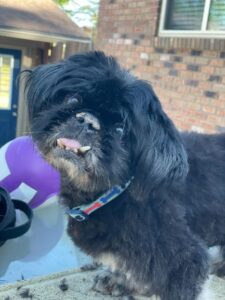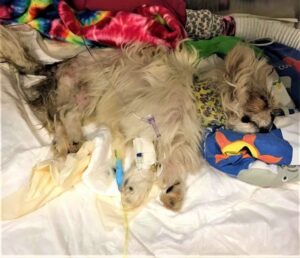Dogs like Ritchie are at the end of the line. We know, we have seen several of dogs in the same situation. Eventually it will be hundreds. No chance of an owner coming back to get them, no chance of youth. Ritchie does have a small chance of having it all again!
We were notified of Ritchie sitting in a shelter. A dog who was ragged, old, skinny, matted, rotten stink coming from his mouth, infected ears, and hips that could barely hold him up anymore. I am not sure that I can or will ever understand how a guy like him ended up in a high kill shelter. At eleven pounds, he was teetering on the edge of the cliff. In his better years, he was likely a 17-pound Pekingese. He’s a stocky guy, with big paddle feet and the kindest demeanor anyone could ask for in a dog. Ritchie is so unassuming, happy to be held, napping in a soft bed, or outside in the grass-just be.
There is an entire network of people who watch out for dogs like Ritchie. Our hope is that dogs like this are found quickly and moved out of the shelter quickly. This village works to get dogs like him to safety. The only problem is there are not enough people in the village. There are many more outside the village who cannot be bothered with the welfare of an animal. This is most evident when we look at the American cattle, swine, and chicken industry.

When a guy like Ritchie comes to us, the first steps are to get him comfortable. Comfortable could mean a soft bed for old bones. Comfortable could mean antibiotics that work to clear an infection. Comfortable does not mean a rush to the vet for dentals and surgeries. Dogs like Ritchie need a place to land and decide if they are going to keep up the fight or if they are going to say “Goodnight.” A little time to encourage healing is the first step in finding out what the rest of their lives will look like.
Charm is another one who came to us at the end of his rope. Charm’s back is fused between almost every disc. He has an arch in his back, much like a rainbow. When Charm came, his back was causing him great pain, he was pooping blood, his ears were infected and oozing, his eyes had dried out so badly they were both permanently jammed open. He couldn’t blink, let alone see. Charm needed food, pain relief, and his bowels regulated. His eyes were destroyed but some tear-producing medications were helpful and easy. He had been on the streets, trying to make his way, eating what he found, bumbling into anything. Again, my brain cannot understand how he found himself on the streets. My heart is only grateful that he found us. Thank you again to the village.
Fast forward a few weeks or months later. Veterinary visits begin for dogs like these. Senior panels for bloodwork, chest rads (aka, x-rays) for heart and lung issues, spinal rads for back problems, checking teeth (or tooth as the case may sometimes be). Spays, neuters, cystotomies, tumor removals are decisions we make based on bloodwork, age, quality of life, and prospective time left. Bloodwork most often tells us if they are in liver failure, renal failure, anemic, or infected. If liver or kidney values are high, then all surgeries are halted. A dog may make it out of surgery when they are in renal failure, but the problem is later. The problem is the damage that anesthesia does to the liver and kidneys as it is processed out of the body. It’s a risk we choose not to take anymore after too much heartache. Next, we may have to ramp it up. Something is wrong but the diagnosis is not clear. A dog keeps coughing but his heart and lungs look good. A dog cannot gain weight, but his bloodwork shows nothing significant. A nostril continues to drain, but there is not a tooth that is showing signs of damage. Now specialist appointments. Dentist, dermatologist, internist. We schedule appointments maybe a month out or we drive five hours away to be able to see the appropriate doctor. Living in a rural state doesn’t afford itself to the medical professionals that are always needed.

What happened with Charm and Ritchie, you ask? Charm has spent the last few months concentrating on easy exercise to build some muscle in his back end and eating. His favorite hobby is eating. His second favorite hobby is rolling around in the grass. He can move better; he is more flexible than when he came. He can curl up and nap in his bed now. His back will not ever be restored but keeping him strong and healthy will keep the pain down. He is off pain medication; his heart and lungs are clear, and his bloodwork is insignificant. He is not getting neutered. His eyes will be forever dry, but he knows where he is, he knows he is safe, and he knows when it is dinner time. Boy does he ever know about dinner!

Ritchie has spent time over the last month clearing up a terrible infection, getting stronger in his back end, and front end and eating like a pro. Ritchie’s blood work was scattered. He was tested for an ACTH stimulation test. This test measures adrenal gland function and response to adrenocorticotropic hormone (ACTH). ACTH is a hormone produced in the pituitary gland that stimulates the adrenal glands, which are located on the kidneys, to release a hormone called cortisol. This test tells us whether the dog has hypoadrenocorticism (Addison’s disease), meaning they are underproducing hormones. Or if the dog has hyperadrenocorticism, which means the dog is overactive in the production of hormones, known as Cushing’s disease. With a big sigh of relief, we were able to rule out both of those for Ritchie. His albumin is very low, which can be a sign of liver, kidney, gastrointestinal issues, or rotten infected teeth. We are hopeful that Ritchie just has a trash can mouth. He takes antibiotics, he has been started on prescription food and he is scheduled for a dental. What we need most right now, are positive vibes from everyone that Ritchie comes through his dental with flying colors, even if it means he has no teeth left!

Unfortunately, what Charm and Ritchie have been through is typical for us. We take the dogs who need us the most. A few months back, we took in Gumshoe, Tawdry, and Crawfish. Three dogs who have suspicious blood work, visited the specialist at $600 each, and do not have definitive diagnoses. Once we see the veterinarian, then the veterinarian specialist, and we have tried several tests and procedures, we have no choice but to narrow down the best options for the dog. We give them the best food as determined from the specialist and/or their bloodwork. If they need a lifetime of medicine, they receive it. Yes, it is unsettling when we do not have a solid answer, but sometimes even modern medicine is limited. Rest assured, they will have everything available to them while they are with us including 1,000 kisses a day!




